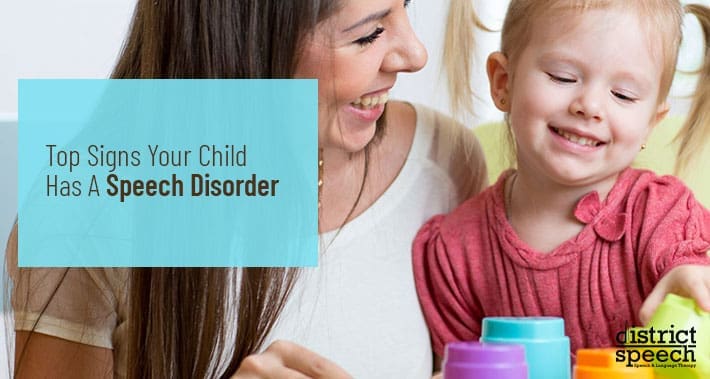
Every parent wants to know their child is developing at an appropriate pace for their age.
Tools such as physical therapy milestone trackers can help you monitor your child’s developmental progress.
But still, many parents still worry.
Perhaps you’re worried little Bobby isn’t developing at the same rate as his peers, or Suzy is having trouble forming some word sounds her cousin of the same age isn’t having issues with.
You know that every child develops at their own pace, but you’re worried that your child could be dealing with an underlying condition.
If this is the case, childhood early intervention in speech disorders can go a long way to help get results in correcting any issues and correcting speech issues.
Here at our pediatric speech therapy clinic we can provide treatment and interventions to improve your child’s speech and help get them back on track.
Keep reading to learn more about the difference between speech and language disorders, and how we can help.
Symptoms Of A Speech Disorder
When your child isn’t developing speech at the same rate as their peers you might worry they may have a speech disorder.
However, comparisons to other children aren’t always the best measure of this.
Knowing how to spot the early signs of speech and language disorders can help to ensure your child gets early intervention should you notice any red flags for speech and language development in your child.
Some signs of a speech disorder to watch for include:
- Nasally sounding voice
- Hoarse breathing or “breathy” sounding voice
- Incorrectly making the sounds for “p”, “b”, “m”, and “h” (common sign in one and two year olds)
- Incorrectly making the sounds for “k”, “g”, “f”, “t”, “d”, and “n” (in children aged two to three years)
- Speaking unclearly even to people who are familiar to them (age two to three years)
If your child is in the two to three year old range, some other signs to watch for include:
- Stretching out sounds
- Pausing often while speaking
- Repeating first sounds of words
- Struggling to say words or sounds
Speech disorders can occur alongside a variety of conditions, such as childhood apraxia of speech, as well as fluency disorders, such as stuttering.
RELATED: What Is Stuttering And How Can A Speech Therapist Help?
Symptoms Of A Language Disorder
Another issue which your child may be experiencing is a language disorder.
The signs of this differ based on the age of the child.
Some of the signs to watch for and what age groups to watch for them for include:
- Not smiling or interacting with others (up to three months)
- Not babbling (four to seven month olds)
- Not using gestures (seven to twelve months)
- Only making a few sounds (seven to twelve months)
- Not seeming to understand other people (seven months to two years)
- Saying only a few words (one year to eighteen months)
- Unable to form sentences (eighteen months to two years)
- Low vocabulary (less than fifty words by two years of age)
- Difficulty interacting with other children (two to three years)
- Difficulty with early reading and writing skills (two and a half to three years)
Language disorders come in a wide range of shapes and sizes may occur alongside conditions such as right hemisphere brain damage as well as Down syndrome.

How Can A Speech Therapist Help?
If you notice any of the above signs in your child, taking them to see a speech and language therapist may help.
Let’s have a look at some of the reasons why seeing a speech therapist early can be beneficial and what some of the benefits of doing so are.
Why Is Early Intervention So Important?
Sometimes when a parent is concerned their child isn’t developing at the same rate as their peers, those around them may say “oh just wait, they’ll catch up eventually”.
While it’s true children will not all develop at the same pace, there are certain milestones which if not reached can be a cause for concern.
Children who have language delays and don’t receive treatment to help them catch up are more likely to have difficulties in school with learning and reading impairments.
Furthermore, while some children who develop their speech skills late will eventually catch up with their peers, there is no way of knowing which ones will catch up and who will be left behind.
That’s early intervention is recommended by The American Speech Language Hearing Association (ASHA).
Let’s have a look at some of the benefits of an intervention.
1. There’s A Chance Your Child Can Eliminate Their Speech Disorder
If a speech issue is identified early, an intervention can help your child to develop the language skills needed to catch up with their peers.
RELATED: What’s The Best Age To Begin Speech Therapy?
This could mean remediation for delayed language development, or speech issues and difficulty pronouncing certain sounds.
2. It Decreases Frustration – For Both Your Child And You
When it comes to treating language delays and disorders, parents play a critical role in helping to make this a success.
After all, your child might spend a few hours per week with a speech therapist, but they’ll spend a lot more time with you.
Giving parents the tools they need to work with the child on language development, and teaching them how to use those tools is important to the success of the intervention.
For instance, learning and using strategies such as basic hand signs to aid communication, especially for non verbal children, can ease frustrations in the short term while you work on long term solutions.
RELATED: Strategy To Help Children & Adults Generalize Newly Learned Articulation Skills Into Conversation
3. It Can Improve Cognitive Development
The first three years of life are critical for speech and language development in children.
Experts consider this early period as the most intensive period for acquiring speech and language skills.
Learning during these critical years affects how the brain develops.
If delays in speech or language are caught early, early detection and intervention can help get development back on track.
Book An Appointment With District Speech
Are you worried your child isn’t developing at the same rate as their peers or cousins of the same age?
Have you ever thought “when their sibling was this age, they were speaking a lot more?”
Did you read the signs of speech or language disorders listed above and recognize them in your child?
Or maybe you’d like to hear about our speech teletherapy options.
If you want an intervention to help your child get back on track, District Speech can help.
Book your appointment with District Speech today to ensure your child gets the best opportunity to stay on track in their development.
1300 I St NW, Suite 400 E,
Washington, DC 20005
- https://g.page/districtspeech
District Speech and Language Therapy specializes in speech therapy, physical therapy, and occupational therapy solutions, for both children and adults, in the Washington D.C and the Arlington Virginia areas.